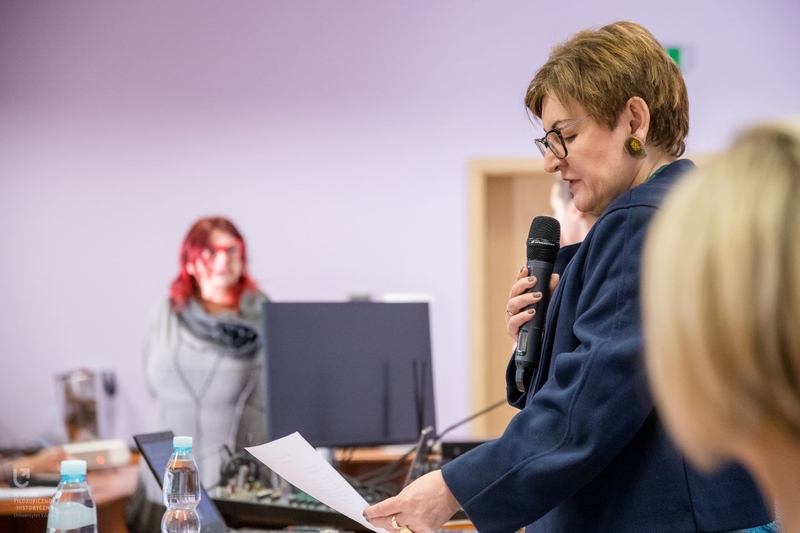The subject of mgr Agnieszka Kołodziejczak's doctoral dissertation is included in the title: "Problem dostępności informacji w instytucjach publicznych oraz podmiotach ekonomii społecznej w obszarze kultury i sztuki dla osób słabo- i niesłyszących w Polsce. Rekomendacje i standardy". The researcher set herself the goal of analysing and verifying the methods which are currently used in the practice of socio-cultural life in Poland that support the accessibility and perception of the content of culture and art.
The research work was undertaken as part of an industrial doctoral programme, i.e. a mode that allows combining scientific and professional work. Dr hab. Aneta Pawłowska, Associate Professor at the University of Lodz was the doctoral dissertation supervisor, while mgr Dariusz Krajewski, Vice President of the Management Board of the Social Support Association "Ja-Ty-My" was the auxiliary supervisor (as part of the industrial doctorate).
Accessibility of culture and art – an innovative research approach from an “insider” perspective
First, it should be strongly underlined that the observations and research initiated by me as part of my doctoral dissertation have not been conducted from the perspective of people dealing with disability as a research field. They were and are conducted from the point of view of a deaf researcher – an insider (who knows sign language), which highlights the cultural and linguistic perspective of the deaf community using sign language. Therefore, they are a type of participant observation, but also autoethnographic reflection in which the researcher is a participant in the community, a self-advocate
– with these words mgr Agnieszka Kołodziejczak, began her speech.
A characteristic feature of Agnieszka Kołodziejczak’s research is the perspective of an insider – a deaf person who uses sign language on a daily basis. Thanks to this, the researcher was able to explore the specific needs and experiences of the deaf community and propose innovative solutions. As part of her doctoral dissertation, she has developed a number of practical tools and solutions that can help increase the accessibility of culture for deaf people.
These include, among other things:
- A model exhibition available: The "Głusza" exhibition at the Silesian Museum in Katowice has been the first project of this type in Poland.
- Educational videos in sign language: The researcher’s original projects, such as "Wymigane zagadnienia renesansu" and "Od wczesnego chrześcijaństwa do gotyku", open up access to knowledge about the history of art for deaf people.
- A deaf museum educator's practice pattern: Thanks to her experience, mgr Kołodziejczak has created a model of educator’s work that can be an inspiration for other cultural institutions.
A breakthrough in Polish science
Agnieszka Kołodziejczak's research is an important step towards creating a more inclusive cultural environment. It is also a specific example of actions to increase the accessibility of higher education for people with special needs. The University of Lodz conducts reliable research. Our “good work” [good job] shapes the foundation for sustainable development and engages the community.
The Academic Support Centre of the University of Lodz supported this doctoral defense from the organisational and technical side, guaranteeing full accessibility for all the event participants. Three Polish Sign Language (in Polish: PJM) interpreters provided interpretation from Polish spoken language to Polish sign language and interpretation from Polish sign language to Polish spoken language. Additionally, we provided ‘live’ subtitles. They were a supplement to the PJM interpreters, enabling accurate monitoring of the defence and understanding of the presented content for people with hearing disabilities, those who did not know PJM or those who had difficulties understanding spoken language. There was also the possibility of using an induction loop.
For Agnieszka Kołodziejczak, defending her doctoral dissertation was not only the finalisation of five years of studies at the University of Lodz Doctoral School of Humanities:
The defense of my doctoral dissertation is the sum of all my professional and private experiences, including those related to being a recipient of culture and art. For me, it is the finalisation of an important stage of life and another consistent step in my professional life, as well as the result of my inner need for action and social activity.

The researcher’s doctoral supervisor, dr hab. Aneta Pawłowska, Associate Professor at the University of Lodz, spoke proudly about her:
We have worked wonderfully together and the result we have achieved is academically very good. I am glad that such a fantastic person received an academic title that opens many doors for her and thanks to which she will be able to do a lot for the community that she supports so much with all her activities. Agnieszka helps people with hearing problems to immerse themselves more fully in visual culture and art, co-leads curatorial tours in various museums and organises exhibitions. I think that the PhD degree will support her in these activities and make her even more credible and her voice will be heard even more.
The committee decided unanimously to accept the defense of the doctoral dissertation. On this basis, a committee proposal will be prepared for the conferment of the PhD degree in Arts Studies to mgr Agnieszka Kolodziejczak. The committee also recommended her doctoral dissertation for the University of Lodz Rector’s Award, as well as for the publication of educational materials related to the doctoral dissertation.
The doctoral dissertation of mgr Agnieszka Kołodziejczak, is available at:
- https://www.wydzfilhist.uni.lodz.pl/procedury
- https://www.bip.uni.lodz.pl/stopnie-naukowe/przewody-doktorskie-postepowania-w-sprawie-nadania-stopnia-doktora
Availability, commitment and support at UniLodz
Read more about activities carried out at our university for accessibility:
- The University of Lodz Academic Support Centre and support for people with special needs
- Scientists from the University of Lodz Honoured in the "Popularyzator Nauki" Competition!
- Representatives of the University of Lodz at "Postępność" – Conference on Progress in Cultural Accessibility
Source: Agnieszka Kołodziejczak, Faculty of Philosophy and History, University of Lodz
Photos: Faculty of Philosophy and History, University of Lodz
Edit: Agata Dawidowicz, Communications and PR Centre, University of Lodz


